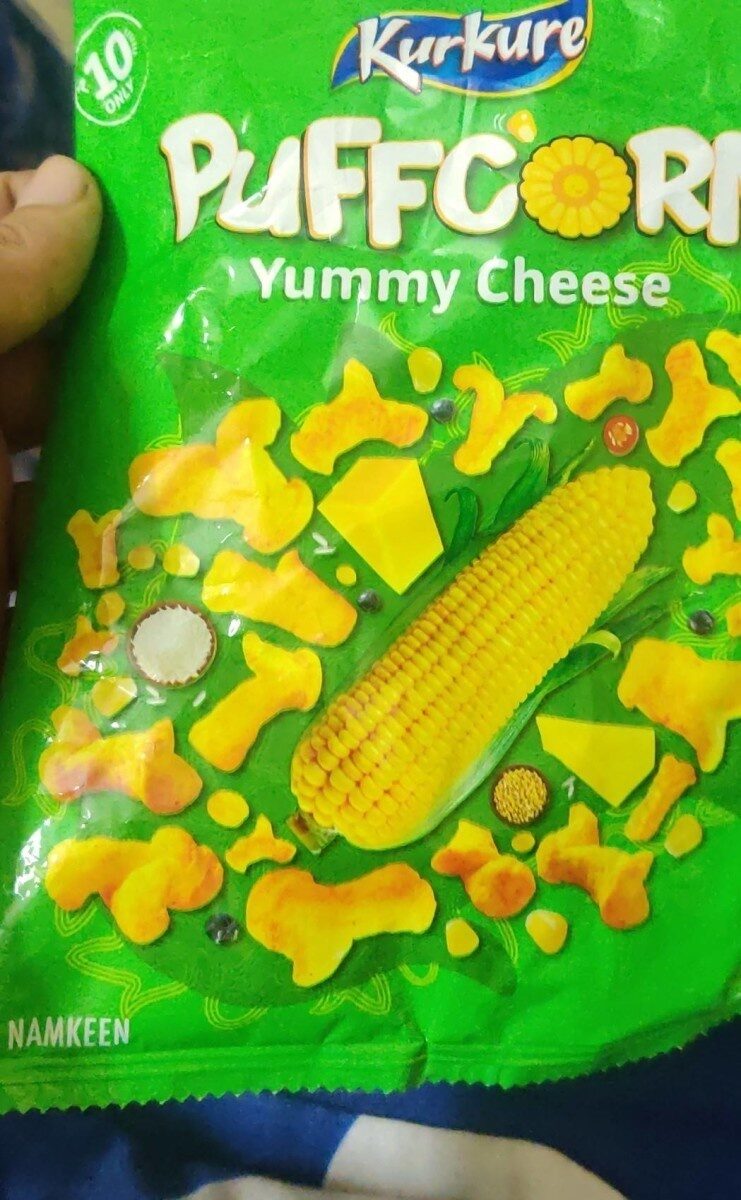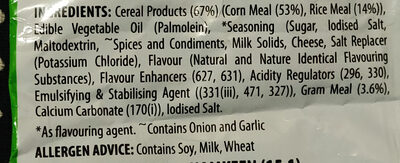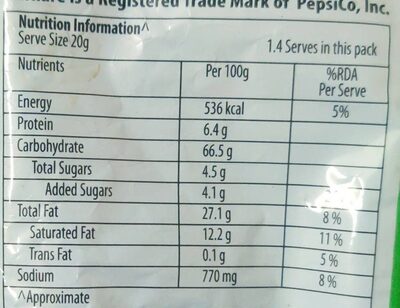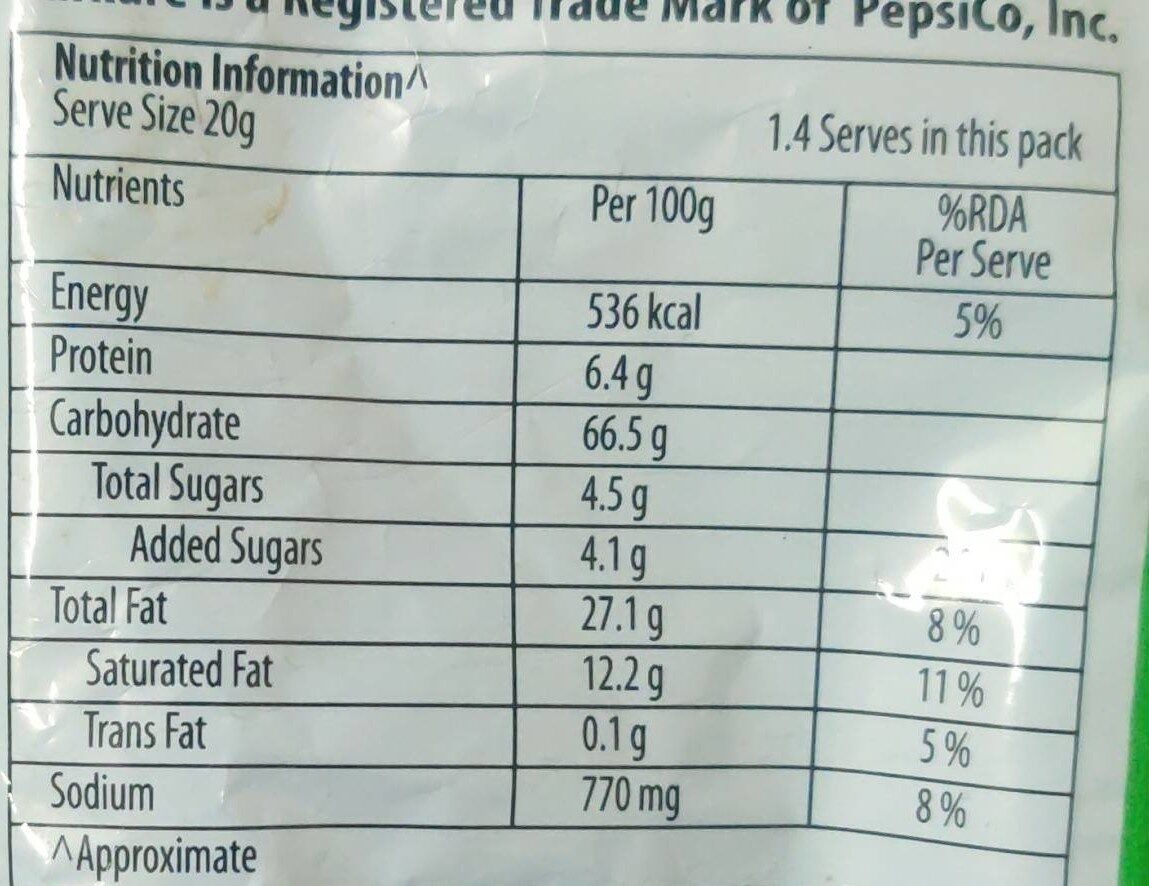Help us make food transparency the norm!
As a non-profit organization, we depend on your donations to continue informing consumers around the world about what they eat.
The food revolution starts with you!
Puffcorn - Kurkure - 28
Puffcorn - Kurkure - 28
This product page is not complete. You can help to complete it by editing it and adding more data from the photos we have, or by taking more photos using the app for Android or iPhone/iPad. Thank you!
×
Barcode: 8901491365703 (EAN / EAN-13)
Quantity: 28
Packaging: Plastic
Brands: Kurkure
Categories: Snacks, Salty snacks, Appetizers, Chips and fries, Crisps, Corn chips
Labels, certifications, awards:
Vegetarian, 100% natural, Green Dot India
Traceability code: 10014064000435
Countries where sold: India
Matching with your preferences
Health
Ingredients
-
36 ingredients
INREDIENTS: Cereal Products (67%) (Corn Meal (53%), Rice Meal (14%)), Edible Vegetable Oil (Palmolein), *Seasoning (Sugar, lodised Salt, Maltodextrin, Spices and Condiments, Milk Solids, Cheese, Salt Replacer (Potassium Chloride), Flavour (Natural and Nature Identical Flavouring Substances), Flavour Enhancers (627, 631), Acidity Regulators (296, 330), Emulsifying & Stabilising Agent ((331(iii), 471, 327)), Gram Meal (3.6%), Calcium Carbonate (170(i)), lodised Salt. *As flavouring agent. Contains Onion and Garlic ALLERGEN ADVICE: Contains Soy, Milk, WheatAllergens: Gluten, Milk, Soybeans
Food processing
-
Ultra processed foods
Elements that indicate the product is in the 4 - Ultra processed food and drink products group:
- Additive: E170 - Calcium carbonates
- Additive: E327 - Calcium lactate
- Additive: E471 - Mono- and diglycerides of fatty acids
- Additive: E627 - Disodium guanylate
- Additive: E631 - Disodium inosinate
- Ingredient: Flavour enhancer
- Ingredient: Flavouring
- Ingredient: Maltodextrin
Food products are classified into 4 groups according to their degree of processing:
- Unprocessed or minimally processed foods
- Processed culinary ingredients
- Processed foods
- Ultra processed foods
The determination of the group is based on the category of the product and on the ingredients it contains.
Additives
-
E170 - Calcium carbonates
Calcium carbonate: Calcium carbonate is a chemical compound with the formula CaCO3. It is a common substance found in rocks as the minerals calcite and aragonite -most notably as limestone, which is a type of sedimentary rock consisting mainly of calcite- and is the main component of pearls and the shells of marine organisms, snails, and eggs. Calcium carbonate is the active ingredient in agricultural lime and is created when calcium ions in hard water react with carbonate ions to create limescale. It is medicinally used as a calcium supplement or as an antacid, but excessive consumption can be hazardous.Source: Wikipedia
-
E296 - Malic acid
Malic acid: Malic acid is an organic compound with the molecular formula C4H6O5. It is a dicarboxylic acid that is made by all living organisms, contributes to the pleasantly sour taste of fruits, and is used as a food additive. Malic acid has two stereoisomeric forms -L- and D-enantiomers-, though only the L-isomer exists naturally. The salts and esters of malic acid are known as malates. The malate anion is an intermediate in the citric acid cycle.Source: Wikipedia
-
E327 - Calcium lactate
Calcium lactate: Calcium lactate is a white crystalline salt with formula C6H10CaO6, consisting of two lactate anions H3C-CHOH-CO−2 for each calcium cation Ca2+. It forms several hydrates, the most common being the pentahydrate C6H10CaO6·5H2O. Calcium lactate is used in medicine, mainly to treat calcium deficiencies; and as a food additive with E number of E327. Some cheese crystals consist of calcium lactate.Source: Wikipedia
-
E330 - Citric acid
Citric acid is a natural organic acid found in citrus fruits such as lemons, oranges, and limes.
It is widely used in the food industry as a flavor enhancer, acidulant, and preservative due to its tart and refreshing taste.
Citric acid is safe for consumption when used in moderation and is considered a generally recognized as safe (GRAS) food additive by regulatory agencies worldwide.
-
E331 - Sodium citrates
Sodium citrate: Sodium citrate may refer to any of the sodium salts of citrate -though most commonly the third-: Monosodium citrate Disodium citrate Trisodium citrateThe three forms of the salt are collectively known by the E number E331. Sodium citrates are used as acidity regulators in food and drinks, and also as emulsifiers for oils. They enable cheeses to melt without becoming greasy.Source: Wikipedia
-
E471 - Mono- and diglycerides of fatty acids
Mono- and diglycerides of fatty acids (E471), are food additives commonly used as emulsifiers in various processed foods.
These compounds consist of glycerol molecules linked to one or two fatty acid chains, which help stabilize and blend water and oil-based ingredients. E471 enhances the texture and shelf life of products like margarine, baked goods, and ice cream, ensuring a smooth and consistent texture.
It is generally considered safe for consumption within established regulatory limits.
-
E627 - Disodium guanylate
Disodium guanylate: Disodium guanylate, also known as sodium 5'-guanylate and disodium 5'-guanylate, is a natural sodium salt of the flavor enhancing nucleotide guanosine monophosphate -GMP-. Disodium guanylate is a food additive with the E number E627. It is commonly used in conjunction with glutamic acid. As it is a fairly expensive additive, it is not used independently of glutamic acid; if disodium guanylate is present in a list of ingredients but MSG does not appear to be, it is likely that glutamic acid is provided as part of another ingredient such as a processed soy protein complex. It is often added to foods in conjunction with disodium inosinate; the combination is known as disodium 5'-ribonucleotides. Disodium guanylate is produced from dried seaweed and is often added to instant noodles, potato chips and other snacks, savory rice, tinned vegetables, cured meats, and packaged soup.Source: Wikipedia
-
E631 - Disodium inosinate
Disodium inosinate: Disodium inosinate -E631- is the disodium salt of inosinic acid with the chemical formula C10H11N4Na2O8P. It is used as a food additive and often found in instant noodles, potato chips, and a variety of other snacks. Although it can be obtained from bacterial fermentation of sugars, it is often commercially prepared from animal sources.Source: Wikipedia
Ingredients analysis
-
Palm oil
Ingredients that contain palm oil: Palm olein
-
Non-vegan
Non-vegan ingredients: Milk solids, CheeseSome ingredients could not be recognized.
We need your help!
You can help us recognize more ingredients and better analyze the list of ingredients for this product and others:
- Edit this product page to correct spelling mistakes in the ingredients list, and/or to remove ingredients in other languages and sentences that are not related to the ingredients.
- Add new entries, synonyms or translations to our multilingual lists of ingredients, ingredient processing methods, and labels.
If you would like to help, join the #ingredients channel on our Slack discussion space and/or learn about ingredients analysis on our wiki. Thank you!
-
Vegetarian
No non-vegetarian ingredients detected
Unrecognized ingredients: Inredients, Cereal-products, Rice-meal, Lodised-salt, Salt-replacer, 627, 631, 296, 330, Emulsifying-and-stabilising-agent, 331, Iii, 471, 327, Gram-meal, 170, I, Lodised-salt, As-flavouring-agentSome ingredients could not be recognized.
We need your help!
You can help us recognize more ingredients and better analyze the list of ingredients for this product and others:
- Edit this product page to correct spelling mistakes in the ingredients list, and/or to remove ingredients in other languages and sentences that are not related to the ingredients.
- Add new entries, synonyms or translations to our multilingual lists of ingredients, ingredient processing methods, and labels.
If you would like to help, join the #ingredients channel on our Slack discussion space and/or learn about ingredients analysis on our wiki. Thank you!
-
Details of the analysis of the ingredients
We need your help!
Some ingredients could not be recognized.
We need your help!
You can help us recognize more ingredients and better analyze the list of ingredients for this product and others:
- Edit this product page to correct spelling mistakes in the ingredients list, and/or to remove ingredients in other languages and sentences that are not related to the ingredients.
- Add new entries, synonyms or translations to our multilingual lists of ingredients, ingredient processing methods, and labels.
If you would like to help, join the #ingredients channel on our Slack discussion space and/or learn about ingredients analysis on our wiki. Thank you!
: INREDIENTS (Cereal Products, Corn Meal), Rice Meal 14%, Edible Vegetable Oil (Palmolein), Seasoning, Sugar, lodised Salt, Maltodextrin, Spices, Condiments, Milk Solids, Cheese, Salt Replacer (Potassium Chloride), Flavour (Natural Flavouring, Nature Identical Flavouring Substances), Flavour Enhancers (627, 631), Acidity Regulators (296, 330), Emulsifying and Stabilising Agent (331 (iii), 471, 327), Gram Meal 3.6%, Calcium Carbonate (170 (i)), lodised Salt, As flavouring agent- INREDIENTS -> en:inredients
- Cereal Products -> en:cereal-products
- Corn Meal -> en:cornmeal - vegan: yes - vegetarian: yes - ciqual_food_code: 9615
- Rice Meal -> en:rice-meal - percent: 14
- Edible Vegetable Oil -> en:vegetable-oil - vegan: yes - vegetarian: yes - from_palm_oil: maybe
- Palmolein -> en:palm-olein - vegan: yes - vegetarian: yes - from_palm_oil: yes - ciqual_food_code: 16129
- Seasoning -> en:coating - vegan: maybe - vegetarian: maybe
- Sugar -> en:sugar - vegan: yes - vegetarian: yes - ciqual_proxy_food_code: 31016
- lodised Salt -> en:lodised-salt
- Maltodextrin -> en:maltodextrin - vegan: yes - vegetarian: yes
- Spices -> en:spice - vegan: yes - vegetarian: yes
- Condiments -> en:condiment - vegan: maybe - vegetarian: maybe
- Milk Solids -> en:milk-solids - vegan: no - vegetarian: yes - ciqual_proxy_food_code: 19051
- Cheese -> en:cheese - vegan: no - vegetarian: maybe - ciqual_proxy_food_code: 12999
- Salt Replacer -> en:salt-replacer
- Potassium Chloride -> en:e508 - vegan: yes - vegetarian: yes
- Flavour -> en:flavouring - vegan: maybe - vegetarian: maybe
- Natural Flavouring -> en:natural-flavouring - vegan: maybe - vegetarian: maybe
- Nature Identical Flavouring Substances -> en:nature-identical-flavouring - vegan: maybe - vegetarian: maybe
- Flavour Enhancers -> en:flavour-enhancer
- 627 -> en:627
- 631 -> en:631
- Acidity Regulators -> en:acidity-regulator
- 296 -> en:296
- 330 -> en:330
- Emulsifying and Stabilising Agent -> en:emulsifying-and-stabilising-agent
- 331 -> en:331
- iii -> en:iii
- 471 -> en:471
- 327 -> en:327
- 331 -> en:331
- Gram Meal -> en:gram-meal - percent: 3.6
- Calcium Carbonate -> en:e170i - vegan: maybe - vegetarian: maybe
- 170 -> en:170
- i -> en:i
- 170 -> en:170
- lodised Salt -> en:lodised-salt
- As flavouring agent -> en:as-flavouring-agent
Nutrition
-
Bad nutritional quality
⚠ ️Warning: the amount of fiber is not specified, their possible positive contribution to the grade could not be taken into account.This product is not considered a beverage for the calculation of the Nutri-Score.
Positive points: 0
- Proteins: 3 / 5 (value: 6.4, rounded value: 6.4)
- Fiber: 0 / 5 (value: 0, rounded value: 0)
- Fruits, vegetables, nuts, and colza/walnut/olive oils: 0 / 5 (value: 0, rounded value: 0)
Negative points: 24
- Energy: 6 / 10 (value: 2243, rounded value: 2243)
- Sugars: 0 / 10 (value: 4.5, rounded value: 4.5)
- Saturated fat: 10 / 10 (value: 12.2, rounded value: 12.2)
- Sodium: 8 / 10 (value: 770, rounded value: 770)
The points for proteins are not counted because the negative points are greater or equal to 11.
Nutritional score: (24 - 0)
Nutri-Score:
-
Nutrient levels
-
Fat in high quantity (27.1%)
What you need to know- A high consumption of fat, especially saturated fats, can raise cholesterol, which increases the risk of heart diseases.
Recommendation: Limit the consumption of fat and saturated fat- Choose products with lower fat and saturated fat content.
-
Saturated fat in high quantity (12.2%)
What you need to know- A high consumption of fat, especially saturated fats, can raise cholesterol, which increases the risk of heart diseases.
Recommendation: Limit the consumption of fat and saturated fat- Choose products with lower fat and saturated fat content.
-
Sugars in low quantity (4.5%)
What you need to know- A high consumption of sugar can cause weight gain and tooth decay. It also augments the risk of type 2 diabetes and cardio-vascular diseases.
Recommendation: Limit the consumption of sugar and sugary drinks- Sugary drinks (such as sodas, fruit beverages, and fruit juices and nectars) should be limited as much as possible (no more than 1 glass a day).
- Choose products with lower sugar content and reduce the consumption of products with added sugars.
-
Salt in high quantity (1.93%)
What you need to know- A high consumption of salt (or sodium) can cause raised blood pressure, which can increase the risk of heart disease and stroke.
- Many people who have high blood pressure do not know it, as there are often no symptoms.
- Most people consume too much salt (on average 9 to 12 grams per day), around twice the recommended maximum level of intake.
Recommendation: Limit the consumption of salt and salted food- Reduce the quantity of salt used when cooking, and don't salt again at the table.
- Limit the consumption of salty snacks and choose products with lower salt content.
-
-
Nutrition facts
Nutrition facts As sold
for 100 g / 100 mlCompared to: Corn chips Energy 2,243 kj
(536 kcal)+9% Fat 27.1 g +14% Saturated fat 12.2 g +277% Trans fat 0.1 g Carbohydrates 66.5 g +8% Sugars 4.5 g +176% Fiber ? Proteins 6.4 g -5% Salt 1.925 g +62% Fruits‚ vegetables‚ nuts and rapeseed‚ walnut and olive oils (estimate from ingredients list analysis) 0 %
Environment
-
Eco-Score B - Low environmental impact
⚠ ️Select a country in order to include the full impact of transportation.The Eco-Score is an experimental score that summarizes the environmental impacts of food products.→ The Eco-Score was initially developped for France and it is being extended to other European countries. The Eco-Score formula is subject to change as it is regularly improved to make it more precise and better suited to each country.Life cycle analysis
-
Average impact of products of the same category: A (Score: 87/100)
Category: Corn chips or tortilla chips
Category: Corn chips or tortilla chips
- PEF environmental score: 0.22 (the lower the score, the lower the impact)
- including impact on climate change: 1.54 kg CO2 eq/kg of product
Stage Impact Agriculture
62.8 %Processing
17.3 %Packaging
10.6 %Transportation
7.1 %Distribution
2.2 %Consumption
0.0 %
Bonuses and maluses
-
Missing origins of ingredients information
Malus: -5
⚠ ️ The origins of the ingredients of this product are not indicated.
If they are indicated on the packaging, you can modify the product sheet and add them.
If you are the manufacturer of this product, you can send us the information with our free platform for producers.
-
Ingredients that threatens species
Malus: -10
Contains palm oil
Tropical forests in Asia, Africa and Latin America are destroyed to create and expand oil palm tree plantations. The deforestation contributes to climate change, and it endangers species such as the orangutan, the pigmy elephant and the Sumatran rhino.
-
Packaging with a medium impact
Malus: -10
Shape Material Recycling Impact Unknown Plastic High ⚠ ️ The information about the packaging of this product is not sufficiently precise (exact shapes and materials of all components of the packaging).⚠ ️ For a more precise calculation of the Eco-Score, you can modify the product page and add them.
If you are the manufacturer of this product, you can send us the information with our free platform for producers.
Eco-Score for this product
-
Impact for this product: B (Score: 62/100)
Product: Puffcorn - Kurkure - 28
Life cycle analysis score: 87
Sum of bonuses and maluses: -25
Final score: 62/100
-
Carbon footprint
-
Equal to driving 0.8 km in a petrol car
154 g CO² per 100g of product
The carbon emission figure comes from ADEME's Agribalyse database, for the category: Corn chips or tortilla chips (Source: ADEME Agribalyse Database)
Stage Impact Agriculture
53.5 %Processing
15.0 %Packaging
18.2 %Transportation
11.9 %Distribution
1.3 %Consumption
0.0 %
Packaging
-
Packaging with a medium impact
-
Packaging parts
(Plastic)
-
Packaging materials
Material % Packaging weight Plastic
-
Transportation
-
Origins of ingredients
Missing origins of ingredients information
⚠ ️ The origins of the ingredients of this product are not indicated.
If they are indicated on the packaging, you can modify the product sheet and add them.
If you are the manufacturer of this product, you can send us the information with our free platform for producers.Add the origins of ingredients for this product Add the origins of ingredients for this product
Threatened species
-
Contains palm oil
Drives deforestation and threatens species such as the orangutan
Tropical forests in Asia, Africa and Latin America are destroyed to create and expand oil palm tree plantations. The deforestation contributes to climate change, and it endangers species such as the orangutan, the pigmy elephant and the Sumatran rhino.
Report a problem
-
Incomplete or incorrect information?
Category, labels, ingredients, allergens, nutritional information, photos etc.
If the information does not match the information on the packaging, please complete or correct it. Open Food Facts is a collaborative database, and every contribution is useful for all.
Data sources
Product added on by huzaifa
Last edit of product page on by kiliweb.
Product page also edited by ecoscore-impact-estimator, jagograhak, openfoodfacts-contributors, packbot, yuka.sY2b0xO6T85zoF3NwEKvllZlb8L7sijBbB7itG2Pnda0Mb_XbN99vazlA6s.










